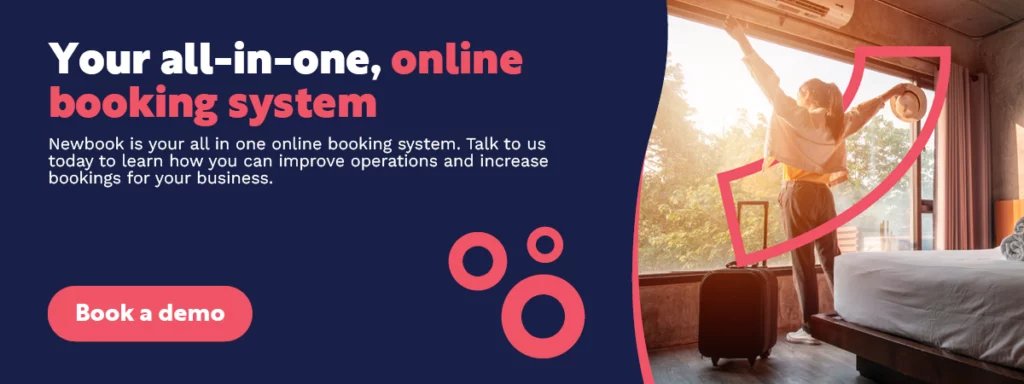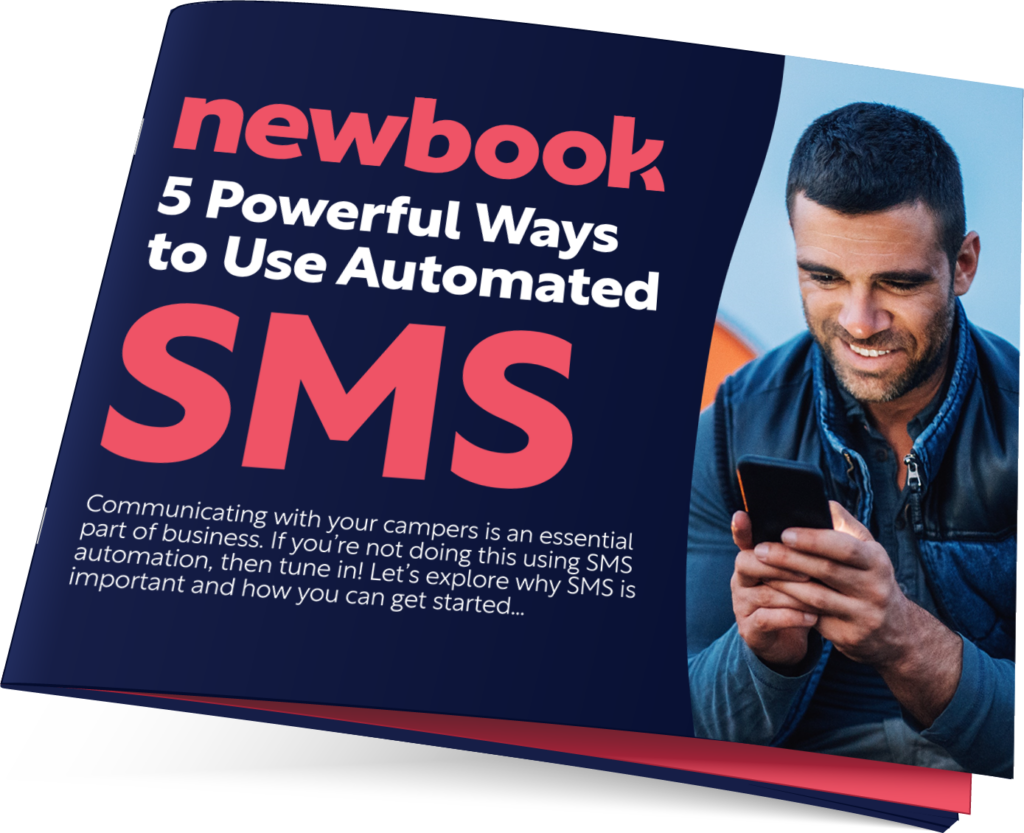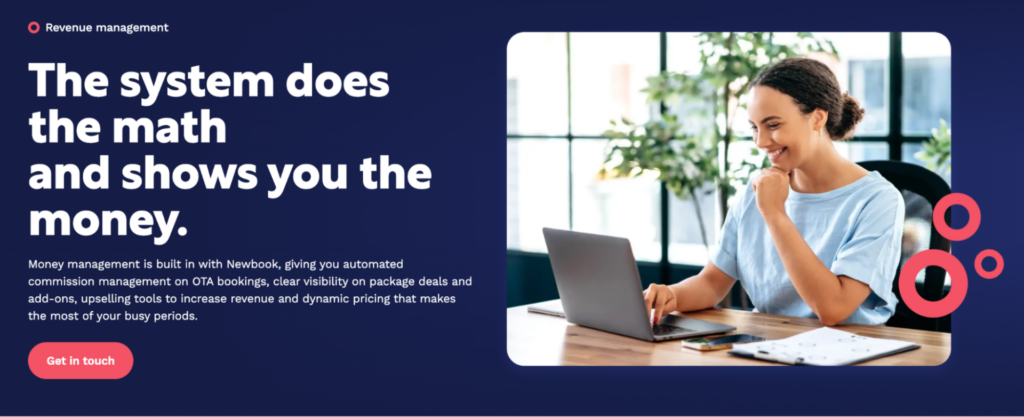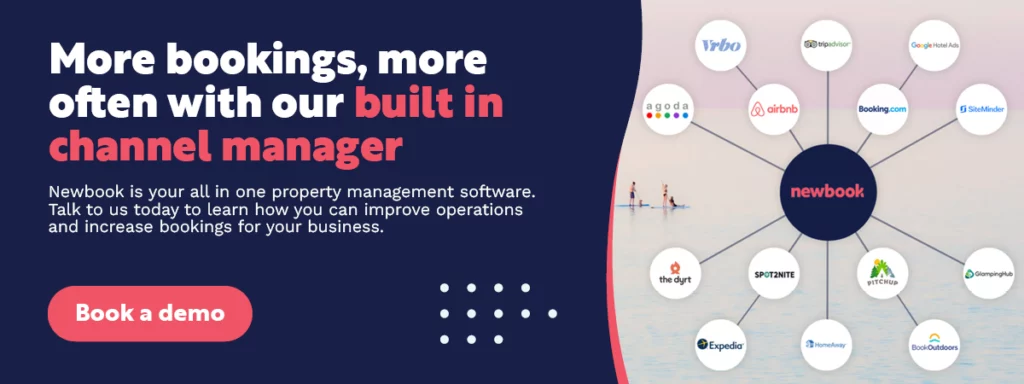Have you ever sat in front of the window, staring out at your resort during the low season, wondering if there could be a way to attract more visitors? And since we’re staring out in wonderment anyway, why not think about whether you’re getting the maximum return on investment for every room, site, or unit that you sell (depending on what your business is)?
Maybe you think it isn’t possible and that there are too many factors to consider that affect pricing to possibly set the right prices at the right time for the right guests. But with revenue management systems, it is not only possible, you can do it without lifting a finger. Yes—there’s a tool called dynamic pricing, which we’ll get into in this article, that allows you to basically set it and forget it when it comes to your accommodation pricing.

Every accommodation provider needs effective revenue management. Without it, you can’t have more than a surface-level understanding of your business’s financial performance. In this article, we explore the ins and outs of revenue management systems, including what they are, why you need one, how to improve your business’s efficiency with one, and more.
What is a Revenue Management System (RMS)?
Revenue management refers to the practice of applying data to develop strategic, profit-boosting pricing models.
It’s used in businesses of all types. However, when it comes to the accommodation industry, revenue management is used more specifically to predict consumer demand so that hotels, holiday parks, resorts, and other hospitality businesses can sell their rooms or sites at the most optimized prices.
An RMS is an intelligent software solution that automates necessary revenue management tasks to save time and increase efficacy. For hospitality businesses, these systems work to calculate and recommend appropriate rates for a specific time of year, customer type, or channel based on the data they collect and analyze.
Common Features of Revenue Management Systems
Revenue management tools come in all shapes and sizes; there is never a one-size-fits-all solution. In many cases, RMS software comes in the form of a comprehensive, standalone system, but often, other software solutions like Property Management Systems (PMS) come equipped with revenue management features that can be just as beneficial.
If you’re on the hunt for an RMS, your choice all comes down to your own unique business size and requirements. However, as an accommodation business, there are a few key features you should keep at the top of your priority list when searching:
- The ability to calculate and suggest rates
- The ability to adjust rates across channels
- Automation
- Competitor analysis
- Occupancy and average daily rate reporting
- Future revenue estimates
At Newbook, we offer advanced revenue and rate management tools to help you respond to market conditions and maximize your profits, like Dynamic Pricing, Tariff Overrides, Master and Dependent Pricing, and a whole stack of comprehensive reports.

1. Dynamic Pricing
Our Dynamic Pricing tool can help you manage your rate fluctuations without lifting a finger. This tool is an integral part of all revenue management solutions and quickly calculates and automates price changes based on occupancy levels throughout your property. All you need to do is set your minimum and maximum rate amounts, and Newbook will do the work for you. We’ll automatically increase your rates as the occupancy for the relevant time frame increases and distribute them across your channels. Our Dynamic Pricing is so effective that our clients have seen up to a 42% increase in their gross revenue within just two years of using it.
2. Tariff Overrides
Our Tariff Overrides feature allows you to make changes to your rates in bulk across multiple channels or just one, e.g. your Newbook Online Booking Engine or Booking.com. Whether you want to increase a specific rate by a fixed amount or several rates by a certain percentage, add a minimum length of stay requirement, or even pause a rate altogether, the options with this feature are endless, not to mention extremely handy and time-saving.
3. Master and Dependent Pricing
Equally as beneficial is our Master and Dependent Pricing feature. This feature will help you adjust your rates quickly and efficiently. Simply set your Master Rate and all its specifications—like minimum stay periods, deposit rules, and cancellation fees—and link up your Dependent Rates so that they automatically pull through the master data. Whenever you adjust your Master Rate, your Dependents will update in relation to the master rules, so you won’t need to worry about making manual changes for each of them. Easy!
4. Reporting
Reporting tools are a must-have for any worthwhile RMS software. Newbook is equipped with a library of helpful reports to provide insight and assist you when making financial or revenue-related decisions. Pretty important stuff.
- First, our Occupancy Report shows you the total figures for the year for each set accommodation category. If you want to delve deeper, our Occupancy History report can be used to show you daily, weekly, or monthly breakdowns for the year.
- Next up is our Dynamic Pricing Report. This report is fantastic when measuring fluctuations in pricing based on Dynamic Rates over your chosen reporting period. It captures the data in a Pie Graph and easy-to-read tables, so it’s super quick and simple to use whilst still delivering valuable information.
- The Bookings Forecast Report allows you to view and compare monthly occupancy and revenue. This report is perfect for investigating how your property is performing now compared to the same time the previous year whilst considering the expected pickup. It utilizes complex formulas to estimate the bookings you could expect to make over the chosen period and compares these potential figures with your total booking performance for the same period last year.
Here’s Why You Need a Revenue Management System (RMS)

The nature of the tourism industry means that hospitality providers, no matter how big or small, must compete with countless factors that ultimately affect their bookings, like supply and demand—that will always be the case. Revenue management systems help navigate this, which is why it’s such an invaluable resource to owners and operators of hospitality businesses.
- First and foremost, it helps businesses boost their bottom line by optimizing rate strategies, but that certainly isn’t the only benefit on offer.
- In terms of operational efficiency, RMS software can help a great deal. These systems put in the hard work to carry out time-consuming calculations and labor-intensive tasks, minimizing both human error and excessive wage expenditure.
- It’s also essential for providing businesses with future revenue projections, allowing them to make more informed, strategic decisions moving forward and improving overall business stability.
Benefits of RMS (Revenue Management System)
Revenue management systems play a crucial role in optimizing revenue for all types of businesses, especially the hospitality industry.
Here are some key benefits of implementing revenue management tools for your accommodation business:
| Benefit of RMS | Why it’s Important |
|---|---|
| Optimized pricing | RMS platforms often use advanced algorithms to aggregate and consider data such as demand patterns, market conditions, and other factors in setting prices dynamically. This helps accommodation providers set optimal prices that maximize revenue based on real-time factors. |
| Effective yield management | RMS enables businesses to identify high-demand periods and adjust pricing accordingly. By optimizing inventory and pricing strategies, businesses can maximize revenue and inventory sales during peak times and minimize losses during low-demand periods. |
| Gain a competitive advantage | With real-time data analysis, RMS allows accommodation providers to respond quickly to changes in the market, competition, or customer behavior. This agility provides a competitive edge by adapting pricing and strategies faster than competitors. |
| Increased profit margins | RMS helps accommodation providers identify opportunities to increase profit margins by adjusting prices based on customer behavior and market conditions. This ensures that prices are not only competitive but also maximize profitability. |
| Analytics and reporting for better business decisions | RMS provides robust analytics and reporting tools, allowing providers to analyze performance, track key metrics, and make data-driven decisions. This enhances strategic planning and helps in refining revenue management strategies over time. |
| Often integrates seamlessly with other systems (e.g., PMS) | Many RMS solutions can integrate seamlessly with other business systems such as property management systems (PMS) in the hospitality industry, ensuring a cohesive and efficient workflow. |
| Automations reduce workload | RMS like Newbook often includes automation functionality that allows things like real-time pricing updates on all platforms, making it easier to ensure that pricing remains consistent on all channels. |

“We made an additional $7000 in one month by using SMS Late Check-Outs.”
– Kathleen Walsh, Advanced Outdoor Solutions
Find out how you can too!
What to Look For in Revenue Management Solutions

When you’re choosing from different revenue management solutions, it can quickly become overwhelming as there are literally hundreds of options presented to you with a quick Google search. How do you even start narrowing down your options?
Going with the top search result isn’t always the best strategy, so let’s take a look at some key factors to keep in mind when evaluating your RMS options:
1. Ease of Use
One of your top priorities when choosing any software for your business, revenue management solutions included, should be how easy it is to use. Of course, every new piece of software is going to have some sort of learning curve, but it should be relatively straightforward to get the software up and running with at least the basics in place.
Most (RMS) system vendors will provide onboarding, so it’s important to take advantage of that so you and your team can learn more about the software. If your team finds that using the software is more productive than not using the software, then they will use it without issue. However, if the software is too difficult to use and ends up adding to their workload instead of lessening it, they will likely opt for the old way of doing things instead.
2. Integration Support
To prevent your data from being siloed in one program, it’s important to ensure that the revenue management system that you choose can seamlessly integrate with the rest of the software that you use on a daily basis for your business operations. This includes software such as:
- Property management system (PMS)
- Customer relationship management system (CRM)
- Email and SMS
3. Customization and Flexibility
Revenue management systems worth their salt should allow for some customization options to align with your business’s specific needs. The ability to tailor pricing strategies (e.g., Newbook allows you to set minimum and maximum prices for the dynamic pricing feature), rules, and reports is essential to ensure the software meets your business goals.
4. Scalability
Choose an (RMS) system that can scale with your business. It should be able to handle increased data volume and complexity as your business grows, ensuring that the revenue management solution remains effective in the long term.
5. Real-Time Data Analysis
Look for an (RMS) system that provides real-time data analysis capabilities. Analyzing and responding promptly to market changes is crucial for dynamic pricing and maximizing revenue.
6. Automation Features
Automation streamlines routine tasks and allows for more efficient revenue management. Look for automated price adjustments, inventory management, and reporting features. This automation should also extend to other systems as well, such as your channel manager, to ensure that the most accurate pricing is listed on all your channels, including OTAs and internal.
Must-Have Integrations in Revenue Management Tools
To boost the effectiveness of your revenue management tools, it’s important that the software integrates with other programs in your tech stack. Some essential integrations for revenue management systems, using Newbook as an example, include:
| Integration Type | Why Having This Integration is Important |
|---|---|
| Online Travel Agency (OTA) connections | Direct integration with OTAs that you list with, such as Airbnb, Booking.com, and more, ensure that your RMS can talk nicely with these providers and update prices in real-time, essential for an effective dynamic pricing strategy. |
| Business Intelligence (BI) | The data that your revenue management system generates should be taken advantage of to help you make better, more informed business decisions. BI software helps you identify key information and visualize it so you can understand it better. |
| Payment gateways | Integrating revenue management systems with your payment gateway just makes sense. This way, you can easily offer your guests secure payments and ensure that these payments are recorded appropriately in your (RMS) system. |
How to Improve Efficiency With Revenue Management Automation
Revenue Management Automation (RMA) can significantly enhance efficiency by automating various tasks related to pricing, inventory management, and decision-making processes. Here are ways to improve efficiency through Revenue Management Automation:
1. Automated Pricing Strategies
The best part about dynamic pricing is that it can be automated through revenue management systems, meaning that you don’t have to lift a finger to manage it. Simply set your minimum and maximum prices, and let the system analyze market conditions, demand, and other factors to set the best prices for your inventory.
2. Intelligent Forecasting
Revenue management systems are able to utilize machine learning and advanced analytics to automate demand forecasting. This allows the system to continuously analyze historical data and market trends, providing accurate predictions without the need for constant manual adjustments.
3. Event-Triggered Automation
Use event-triggered automation to respond to specific market events or changes. For instance, the system can automatically adjust prices or allocate resources differently during special events, holidays, or periods of high demand.
4. Workflow Automation
Streamline workflow processes by automating routine tasks within your revenue management workflow. This includes tasks such as data entry, reconciliation, and reporting, allowing your team to focus on more strategic aspects of revenue management.
Important KPIs for Revenue Management System (RMS)
Revenue management KPIs are essentially performance metrics that help accommodation providers assess how well their business is doing and make informed decisions related to things like pricing and operational strategy. By tracking the right KPIs, accommodation providers can gain the data they need to maximize revenue.
The most commonly used revenue management KPIs for accommodation providers include:
| KPI | Description | Calculation |
|---|---|---|
| Occupancy Rate | Refers to the number of available rooms (or sites, units, villas, etc.) that are occupied at a given time. It’s a great metric for measuring how efficient you are at making use of your available inventory. | Number of occupied rooms / total number of rooms x 100 (to get a percentage) |
| Average Daily Rate (ADR) | Indicated the average income per paid occupied room. This doesn’t include things like room service or other revenue-generating sources. | Divide room revenue earned by the number of rooms sold |
| RevPAR | Stands for Revenue Per Available Room, indicating the amount of revenue generated by all rooms in the hotel. | Two ways to calculate this: 1. Dividing room revenue by the number of rooms available OR 2. Multiplying the average daily rate by the occupancy rate |
| RevPOR | RevPOR considers all the revenue generated from an occupied room, including additional services. | Divide the total revenue generated by occupied rooms by the total number of occupied rooms |
2024 RMS Trend Predictions
Revenue management systems continue to be important tools for accommodation providers as we make our way through 2024. Keeping on top of emerging trends is essential for ensuring that your business stays at the forefront of innovation. Here are some emerging trends to keep an eye on.
1. Increased Technology Use to Increase Efficiency
Due to many different factors, including inflation, accommodation providers are increasingly faced with needing to do more with less. Booking behaviors are also changing, with shorter windows and longer stays becoming more normal. Market factors affecting revenue generation are also becoming more complex, resulting in an accelerated adoption of technology solutions by accommodation providers, from small mom-and-pop businesses to large chains. These technology solutions bring efficiency through automation, artificial intelligence, and more self-service options that reduce the need for accommodation businesses to have staff onsite at all times.
2. Using A Wide Range of Data Sources to Influence Revenue Forecasts
Data is called the new oil for good reason. In the hospitality industry, it can help accommodation providers better understand their customers, market, and industry as a whole. Being able to analyze and glean insights from historical and current data surrounding demand, market conditions, inventory management, and more is essential to create educated forecasts that can set realistic expectations. Revenue management systems can help simplify complex sets of data and assist with generating reports for a better understanding of said data.
3. More Flexibility in Pricing Strategies
A trend that’s continuing in 2024 is the shift away from static pricing strategies in favor of flexible pricing strategies like dynamic pricing. Being able to facilitate real-time pricing adjustments based on a wide range of factors is important for accommodation providers to be able to react to sudden changes and remain competitive.
For instance, let’s say a major event like a music festival is taking place in the area where your business is located. While everyone adjusts their prices accordingly around you, your dynamic pricing system can analyze the current market demand in real-time and adjust your prices for you without you having to do anything.
Why Newbooks’ Revenue Management Systems (RMS) Is the Best Option to Boost Revenue

A revenue manager must monitor sales data from various sources such as rooms, restaurants, attractions, facility rentals, and more. Additionally, they need to stay informed about local events, travel conditions, weather, economic factors, and internal data on trends and guest behavior. Given the overwhelming amount of data, it is logical for the revenue manager to require a system to consolidate and interpret this information.
In essence, the revenue manager must blend their ability to interpret data with their hospitality experience so they can decide the appropriate level of automation for pricing specific to the accommodation business.
For instance, automation within the revenue management system might lower prices at the beginning of the Winter season. However, unexpected warm temperatures lead to higher-than-expected occupancy. Armed with this knowledge, the hotel revenue manager can temporarily halt the automation, maintaining prices at the previous season’s levels.
It is crucial to combine an RMS and a PMS to centralize data. Newbook offers commission management, upselling tools, dynamic pricing functionality, and robust property management features to ensure both quantitative and qualitative data are in one place. Dynamic pricing further reduces the need for constant monitoring, as setting minimum and maximum rates is sufficient, allowing the system to autonomously generate optimal prices using market intelligence data.

Conclusion
Effective revenue management is crucial for accommodation providers looking to thrive in a dynamic market. The significance of revenue management systems cannot be overstated, especially in the software’s ability to optimize pricing, improve operational efficiency, and help accommodation providers stay competitive.
Newbook’s advanced revenue and rate management tools, including dynamic pricing, tariff overrides, master and dependent pricing, and robust reporting features make up a comprehensive solution.
Learn more about how Newbook can help improve your business by reaching out to us today.

